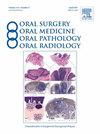OTH-8 Patient reported anxiety, before and after colonoscopy, during the COVID-19 pandemic
Oral surgery, oral medicine, oral pathology, oral radiology, and endodontics
Pub Date : 2021-11-01
DOI:10.1136/gutjnl-2021-bsg.36
引用次数: 0
Abstract
IntroductionAt the start of the covid-19 pandemic, many invasive diagnostic tests had to be stopped to avoid patients catching covid-19 as a result of attending hospital. Several procedures to reduce COVID transmission have been implemented as services resumed (e.g. COVID testing). Despite this, some patients may still experience what is now called ‘COVID anxiety’. The aim of this study was to monitor satisfaction with covid mitigation measures and anxiety among patients attending colonoscopy following an abnormal screening result.MethodsWe surveyed patients who were invited for colonoscopy at St Mark’s Hospital between July 2020 and May 2021. Data on anxiety and worry were collected, 3 days before and after colonoscopy;scales ranged from 6-24 for general anxiety, 0-20 for COVID-anxiety and 1-4 for bowel cancer worry (with higher scores representing greater anxiety for all three measures). Descriptive statistics were used to assess mean pre- and post-procedure anxiety scores. Inferential statistics were used to test for differences in anxiety, before and after colonoscopy. All analyses were performed using SPSS (Ver 27.0).Results205 patients (mean age 67 years;114 males, 91 females;121 White, 55, South Asian, 27 any other ethnicity;142 English first language speakers) completed the pre-procedure questionnaire and were enrolled into the study. 89 (43.4%) completed the post-procedure questionnaire and were analysed.Pre- procedure, mean general anxiety, COVID-anxiety, and bowel cancer worry scores were 10.94, 0.93 and 1.95, respectively. Post-procedure, the general anxiety, COVID-anxiety and bowel cancer worry scores were 8.92, 1.03 and 2.11, respectively. The change in general anxiety (-2.02) was statistically significant (p=0.015), while the changes in COVID anxiety (+0.1) and bowel cancer worry (+0.16) were not (both ps<0.05).Significant reductions in general anxiety were observed for women (pre- and post-procedure general anxiety scores were: 13.05 vs. 8.33, respectively;p<0.001), White British adults (pre- and post-procedure general anxiety scores were: 11.47 and 8.90, respectively;p<0.001) and adults whose first language was English (pre- and post-procedure general anxiety scores were: 11.49 and 9.08, respectively;p<0.001).The majority of patients were highly satisfied with the covid-measures put in place. There was no association between satisfaction and changes in COVID Anxiety (p<0.05).ConclusionsCOVID anxiety was low among people who attended colonoscopy. General anxiety, however, was moderate, although it was reduced following the procedure. General anxiety was not reduced for some groups, including those whose first language is not English, highlighting the need for further research into factors affecting experience in these groups.OTH-8患者在COVID-19大流行期间结肠镜检查前后报告焦虑
在covid-19大流行开始时,必须停止许多侵入性诊断测试,以避免患者因住院而感染covid-19。随着业务恢复,已经实施了一些减少COVID传播的程序(例如COVID检测)。尽管如此,一些患者可能仍然会经历现在所谓的“COVID焦虑”。本研究的目的是监测筛查结果异常后参加结肠镜检查的患者对covid缓解措施的满意度和焦虑。方法:我们调查了2020年7月至2021年5月期间在圣马可医院接受结肠镜检查的患者。在结肠镜检查前后3天收集焦虑和担忧的数据;一般焦虑的评分范围为6-24,covid - 19焦虑的评分范围为0-20,肠癌担忧的评分范围为1-4(得分越高,这三项指标的焦虑程度越高)。描述性统计用于评估手术前后的平均焦虑评分。采用推理统计来检验结肠镜检查前后焦虑的差异。所有分析均使用SPSS (Ver 27.0)进行。结果205例患者(平均年龄67岁,男性114例,女性91例;白人121例,南亚裔55例,其他种族27例;142例以英语为母语者)完成了术前问卷调查并纳入研究。89例(43.4%)完成术后问卷调查并进行分析。术前、一般焦虑、新冠焦虑和肠癌焦虑的平均得分分别为10.94、0.93和1.95。术后一般焦虑、新冠焦虑和肠癌焦虑得分分别为8.92、1.03和2.11。一般焦虑(-2.02)变化有统计学意义(p=0.015),而COVID焦虑(+0.1)和肠癌焦虑(+0.16)变化无统计学意义(p均<0.05)。女性(手术前和手术后的一般焦虑评分分别为:13.05和8.33,p<0.001)、英国白人成年人(手术前和手术后的一般焦虑评分分别为:11.47和8.90,p<0.001)和母语为英语的成年人(手术前和手术后的一般焦虑评分分别为:11.49和9.08,p<0.001)的一般焦虑显著降低。大多数患者对采取的抗疫措施非常满意。满意度与新冠焦虑变化无相关性(p<0.05)。结论参加结肠镜检查的患者的scovid焦虑水平较低。然而,总体焦虑是中度的,尽管在手术后有所减少。对于一些群体,包括那些母语不是英语的人来说,总体焦虑并没有减少,这凸显了对影响这些群体体验的因素进行进一步研究的必要性。
本文章由计算机程序翻译,如有差异,请以英文原文为准。
求助全文
约1分钟内获得全文
求助全文
来源期刊
自引率
0.00%
发文量
0
审稿时长
1 months

 求助内容:
求助内容: 应助结果提醒方式:
应助结果提醒方式:


